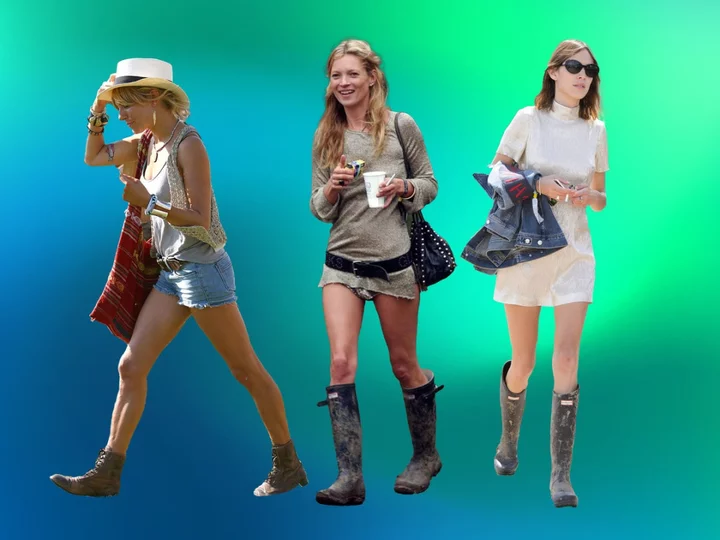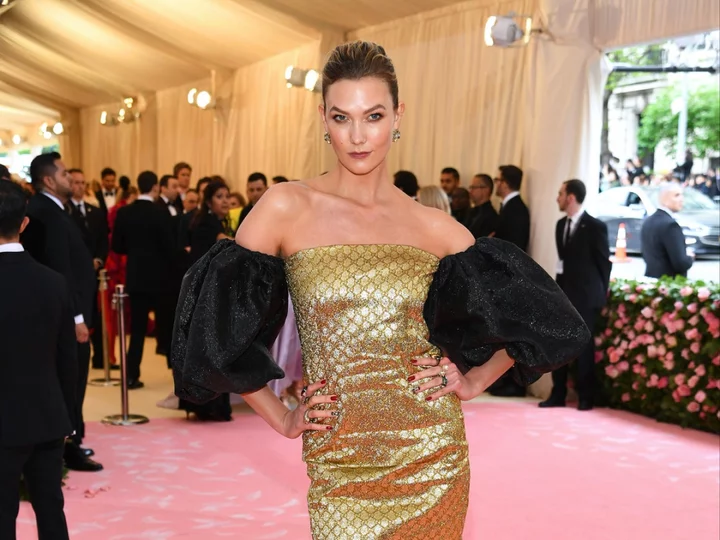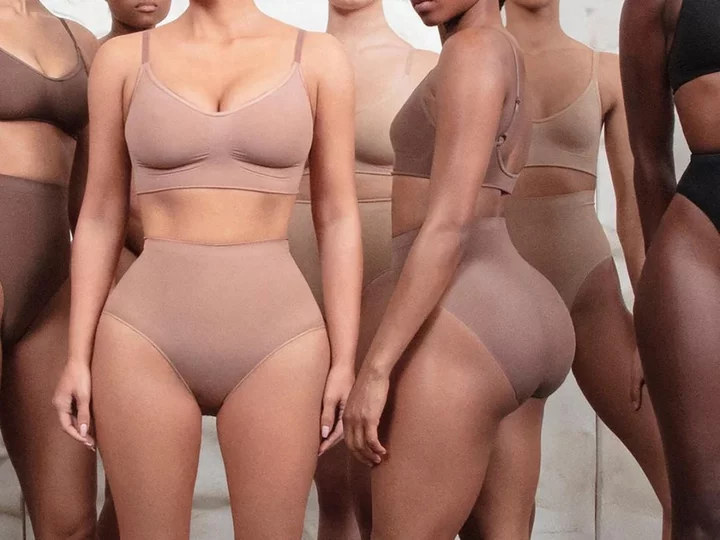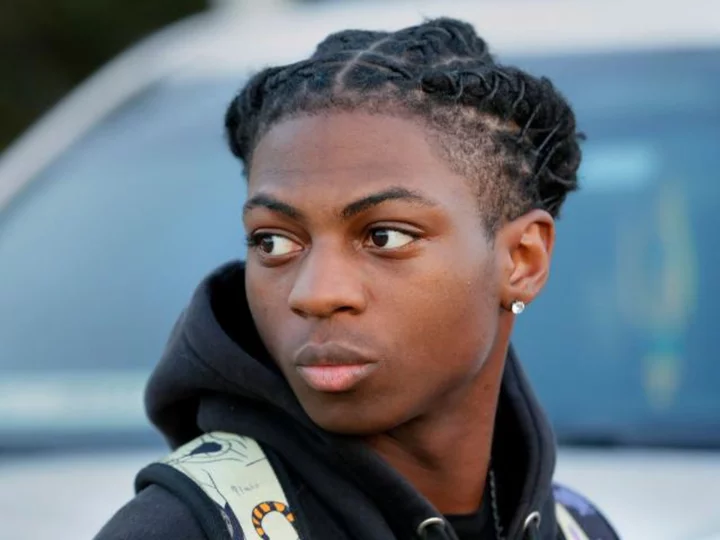Festival fashion isn’t just about ripping off Kate Moss… it might not even exist anymore
Views: 2310
2023-06-22 13:53
Crop tops. Denim cut-offs. Someone else’s wellies. In 2023, festival fashion has officially become a tired sport. Even the words themselves carry connotations that seem to have fallen far out of sync with the sartorial zeitgeist. Is anyone still slathering themselves in glitter? Do we still care about sequins and novelty sunglasses? And surely we’ve all long-tired of neon by now? With Glastonbury Festival underway this weekend, all of this begs one crucial, singular question: Does festival fashion still exist? The fashion industry’s growing environmental conscience might provide an answer. Today, it’s much cooler to source your wardrobe from the likes of Depop and your local charity shop than Asos or Big Topshop (RIP). We fell out of love with fast fashion some time ago and, as a result, generally far more considerate consumers when it comes to our clothing. This is, of course, a very good thing. But it’s also completely at odds with the concept of festival fashion. Few modes of dressing revolve around disposability quite like it. Think about it. A typical festival lasts one weekend, during which time you will inevitably be camping in a wide range of weather scenarios, sweating and dancing for hours on end without access to showers. You’ll also be surrounded by scores of people who may or may not raid your tent for all of your belongings. In short, you don’t exactly want to bring items you care about. Hence why fast fashion and festivals made so much sense; flimsy, cheap, tacky garments comprised the optimum capsule wardrobe. At least they did, anyway – until everyone wised up to the environmental consequences. Nonetheless, if you’re going to a festival this summer, it’s a universally accepted truth that you will probably have to wear some clothes. Where, then, does that leave you? And what of festival fashion trends? Is there space to tap into the latest cool, new thing when you’re trying to shop sustainably and save money? Can we still have a hot girl (festival) summer? “The cost of living crisis is having a huge impact on young peoples’ purchasing patterns, particularly when it comes to ad hoc events, so second-hand buys are proving a big hit for festival season,” says Emily Gordon-Smith, content director and sustainability lead at the trend and insights forecaster Stylus. “This means tapping into more personalised looks, not straight off the high street, and often with a nod to iconic festival-ready styling that definitely includes Kate Moss in her Glasto heyday.” As any seasoned festival-goer will know, few outfits have stood the test of time quite like Moss’s from the early Noughties. One quick Google search will bring up hundreds of infamous shots of the model stomping through the muddy fields in micro-shorts, leather trousers, waistcoats, belted mini dresses, and other understated, utilitarian looks that couldn’t be further from the festival fashion aesthetic du jour. Other style mavens for the era? Alexa Chung in a silver mini dress with a jumper tied loosely around her waist. Sienna Miller in yellow sunglasses and a studded belt. And so on. They weren’t so much dressing for festivals as they were just dressing for a day of drinking beer and watching live music. Yes, they looked amazing, but it wasn’t because they were soaking themselves in lame co-ords. It was because they weren’t trying very hard, and it’s this modus operandi that has established itself at the centre of festival fashion now. Kate’s festival looks are still being recreated on the runways, with key items like the waistcoats and flat knee boots appearing in many collections Emily Gordon-Smith It’s also at the root of the Y2K trends reigning supreme on catwalks across the globe for the last year. “The Nineties and Noughties continue to be eras of stylistic fascination for those not even old enough to remember them, so of course style icons like Kate Moss are a major reference point,” adds Gordon-Smith. “Her festival looks are still being recreated on the runways, with key items like the waistcoats and flat knee boots appearing in many collections including those from Celine and Stella McCartney.” As for how to incorporate all this into your own festival wardrobe, it’s obviously not as easy as popping into a high-end luxury store and snapping up a £700 waistcoat. But if you want to follow in Moss and Co’s footsteps, the way to do it is to actually do the exact opposite and try and find something unique. It might sound counterintuitive but, ultimately, that’s what made their outfits so memorable in the first place; you couldn’t easily replicate them. That’s not to say you can’t look for key items, like tinted sunglasses and mini dresses, but you can find standout ones by taking your search onto secondhand shopping platforms, where you’ll find limitless options and one-off pieces. On Depop, some of the most searched-for items reflect a wide range of trends for festival season, spanning from “silver” (21 per cent increase in searches) and “lace cami” (37 per cent) to “mirror” (65 per cent) and “parachute pants” (1,200 per cent). If you do find yourself wanting to follow the crowd, though, the leading trend of the season is “Western”. According to money-saving platform WeThrift, searches for the “cowboy aesthetic” have increased by 40 per cent on Pinterest in the last 90 days. Meanwhile, over on TikTok, the #cowboyaesthetic hashtag has surpassed more than 4.3 million views. The hashtag #cowboyboots has more than 920.9 million views. Similar data has been found by retailers, with Pretty Little Thing reporting a 57 per cent increase in searches for cowboy boots in the last month, while “Western” searches have surged by 49 per cent. So long as you wear it right, it’s a look that reflects the boho chic image of the early Noughties Glastonbury set. Our suggestion is to pair some brightly coloured boots (we love these ones) with a secondhand slip dress and a pair of yellow-tinted shades. Throw on an oversized cargo jacket and you’re all set. Alternatively, if the sun is shining you might find yourself wanting to opt for a pair of statement trainers (these ones are very Nineties), which would work well with some classic Adidas tracksuit bottoms, a lace cami and some tiny sunglasses, amounting to a very Bella Hadid look. If you must do the crop top and denim cut-offs combo, there are ways to reinvent it a little. Try a knitted option from sustainable Australian brand MNK, for example, and there are plenty of secondhand denim shorts available across the web. All of it is easy to do – and far more comfortable than the festival outfits of yore – if you know what you’re doing. Just remember, though, that if you’re channelling Moss, less is always more. Don’t be afraid to take risks. And stay very far away from the glitter. Read More Glastonbury 2023 – live: Immigration enforcement officers spotted near festival site at Castle Cary station Flip-flops, nudity and ‘up the vajayjay!’: How the red carpet became a platform for protest Subversive? Dangerous? Boring?: How the red carpet became a barometer for modern masculinity

Crop tops. Denim cut-offs. Someone else’s wellies. In 2023, festival fashion has officially become a tired sport. Even the words themselves carry connotations that seem to have fallen far out of sync with the sartorial zeitgeist. Is anyone still slathering themselves in glitter? Do we still care about sequins and novelty sunglasses? And surely we’ve all long-tired of neon by now? With Glastonbury Festival underway this weekend, all of this begs one crucial, singular question: Does festival fashion still exist?
The fashion industry’s growing environmental conscience might provide an answer. Today, it’s much cooler to source your wardrobe from the likes of Depop and your local charity shop than Asos or Big Topshop (RIP). We fell out of love with fast fashion some time ago and, as a result, generally far more considerate consumers when it comes to our clothing. This is, of course, a very good thing. But it’s also completely at odds with the concept of festival fashion.
Few modes of dressing revolve around disposability quite like it. Think about it. A typical festival lasts one weekend, during which time you will inevitably be camping in a wide range of weather scenarios, sweating and dancing for hours on end without access to showers. You’ll also be surrounded by scores of people who may or may not raid your tent for all of your belongings. In short, you don’t exactly want to bring items you care about.
Hence why fast fashion and festivals made so much sense; flimsy, cheap, tacky garments comprised the optimum capsule wardrobe. At least they did, anyway – until everyone wised up to the environmental consequences. Nonetheless, if you’re going to a festival this summer, it’s a universally accepted truth that you will probably have to wear some clothes. Where, then, does that leave you? And what of festival fashion trends? Is there space to tap into the latest cool, new thing when you’re trying to shop sustainably and save money? Can we still have a hot girl (festival) summer?
“The cost of living crisis is having a huge impact on young peoples’ purchasing patterns, particularly when it comes to ad hoc events, so second-hand buys are proving a big hit for festival season,” says Emily Gordon-Smith, content director and sustainability lead at the trend and insights forecaster Stylus. “This means tapping into more personalised looks, not straight off the high street, and often with a nod to iconic festival-ready styling that definitely includes Kate Moss in her Glasto heyday.”
As any seasoned festival-goer will know, few outfits have stood the test of time quite like Moss’s from the early Noughties. One quick Google search will bring up hundreds of infamous shots of the model stomping through the muddy fields in micro-shorts, leather trousers, waistcoats, belted mini dresses, and other understated, utilitarian looks that couldn’t be further from the festival fashion aesthetic du jour. Other style mavens for the era? Alexa Chung in a silver mini dress with a jumper tied loosely around her waist. Sienna Miller in yellow sunglasses and a studded belt. And so on.
They weren’t so much dressing for festivals as they were just dressing for a day of drinking beer and watching live music. Yes, they looked amazing, but it wasn’t because they were soaking themselves in lame co-ords. It was because they weren’t trying very hard, and it’s this modus operandi that has established itself at the centre of festival fashion now.
Kate’s festival looks are still being recreated on the runways, with key items like the waistcoats and flat knee boots appearing in many collections
Emily Gordon-Smith
It’s also at the root of the Y2K trends reigning supreme on catwalks across the globe for the last year. “The Nineties and Noughties continue to be eras of stylistic fascination for those not even old enough to remember them, so of course style icons like Kate Moss are a major reference point,” adds Gordon-Smith. “Her festival looks are still being recreated on the runways, with key items like the waistcoats and flat knee boots appearing in many collections including those from Celine and Stella McCartney.”
As for how to incorporate all this into your own festival wardrobe, it’s obviously not as easy as popping into a high-end luxury store and snapping up a £700 waistcoat. But if you want to follow in Moss and Co’s footsteps, the way to do it is to actually do the exact opposite and try and find something unique. It might sound counterintuitive but, ultimately, that’s what made their outfits so memorable in the first place; you couldn’t easily replicate them.
That’s not to say you can’t look for key items, like tinted sunglasses and mini dresses, but you can find standout ones by taking your search onto secondhand shopping platforms, where you’ll find limitless options and one-off pieces. On Depop, some of the most searched-for items reflect a wide range of trends for festival season, spanning from “silver” (21 per cent increase in searches) and “lace cami” (37 per cent) to “mirror” (65 per cent) and “parachute pants” (1,200 per cent).
If you do find yourself wanting to follow the crowd, though, the leading trend of the season is “Western”. According to money-saving platform WeThrift, searches for the “cowboy aesthetic” have increased by 40 per cent on Pinterest in the last 90 days. Meanwhile, over on TikTok, the #cowboyaesthetic hashtag has surpassed more than 4.3 million views. The hashtag #cowboyboots has more than 920.9 million views. Similar data has been found by retailers, with Pretty Little Thing reporting a 57 per cent increase in searches for cowboy boots in the last month, while “Western” searches have surged by 49 per cent.
So long as you wear it right, it’s a look that reflects the boho chic image of the early Noughties Glastonbury set. Our suggestion is to pair some brightly coloured boots (we love these ones) with a secondhand slip dress and a pair of yellow-tinted shades. Throw on an oversized cargo jacket and you’re all set.
Alternatively, if the sun is shining you might find yourself wanting to opt for a pair of statement trainers (these ones are very Nineties), which would work well with some classic Adidas tracksuit bottoms, a lace cami and some tiny sunglasses, amounting to a very Bella Hadid look. If you must do the crop top and denim cut-offs combo, there are ways to reinvent it a little. Try a knitted option from sustainable Australian brand MNK, for example, and there are plenty of secondhand denim shorts available across the web.
All of it is easy to do – and far more comfortable than the festival outfits of yore – if you know what you’re doing. Just remember, though, that if you’re channelling Moss, less is always more. Don’t be afraid to take risks. And stay very far away from the glitter.
Read More
Glastonbury 2023 – live: Immigration enforcement officers spotted near festival site at Castle Cary station
Flip-flops, nudity and ‘up the vajayjay!’: How the red carpet became a platform for protest
Subversive? Dangerous? Boring?: How the red carpet became a barometer for modern masculinity









